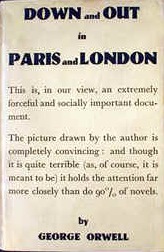
Image from here
Orwell's decision actually to live in poverty sets this book somewhat apart from (say) Henry Mayhew's London Labour and the London Poor and Theodore Dalrymple's Life at the Bottom. He describes the life of the down and out from the inside, rather than as an outside observer. When this was combined with his gift for clear prose and his broad sympathy for humanity, it produced an incredibly powerful series of pictures of the life he and others were obliged to live on the bottom rung of society.
Looking back on the book, however, it's hard to escape the impression that at all times Orwell would have been able to obtain work and money any time he needed it (see chapters 21, 24 and 38). This gives the book a retrospective touch of artificiality that is a little disappointing. While he talks perceptively of how going to the dogs simplifies life by obliterating the future (chapter 3), what he doesn't get to is that after a time, living wholly in the present is crushing: when one's prospects are limited, the future largely consists of things you don't want to think about. And the past is full of things you'd mostly prefer not to remember (the present suffers from the comparison).
This mix of good and bad is perhaps encoded in the structure of the book. The gift for finding the colour and depth in daily life is something Orwell shares with Ray Lawler and Albert Camus. But it sits awkwardly with describing a life as utterly dead-ended as Huis Clos.
No comments:
Post a Comment